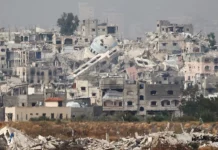ANTAKYA: Rescuers struggled to dig people out of the rubble of collapsed buildings on Tuesday in a “race against time” as the death toll from an earthquake across a wide area of Turkey and Syria passed 5,000.
The magnitude 7.8 quake — the deadliest in Turkey since 1999 — hit early on Monday and was followed by a second hours later.
Thousands of buildings were toppled, hospitals and schools wrecked and tens of thousands of people were injured or left homeless in several Turkish and Syrian cities.
Turkish President Tayyip Erdogan declared as a disaster zone in 10 provinces, imposing a state of emergency in the region for three months.
A UN official said thousands of children may be among the dead.
Harsh winter weather hampered search efforts and the delivery of aid and made the plight of the homeless even more miserable. Some areas were without fuel and electricity.
Aid officials voiced particular concern about the situation in Syria, already afflicted by a humanitarian crisis after nearly 12 years of civil war.
In Turkey, the death toll had climbed to 3,419 people by Tuesday morning, Vice President Fuat Oktay said. In Syria, the death toll stood at just over 1,600, according to the government and a rescue service in the in-surgent-held northwest.
Turkish authorities say some 13.5 million people were affected in an area spanning roughly 450 km from Adana in the west to Diyarbakir in the east, and 300 km from Malatya in the north to Hatay in the south. Syr-ian authorities have reported deaths as far south as Hama, some 100 km from the epicentre.
“It’s now a race against time,” World Health Organisation Director General Tedros Adhanom Ghebreyesus said in Geneva. “Every minute, every hour that passes, the chances of finding survivors alive diminishes.”
Across the region, rescuers toiled through the night and into the morning searching for survivors as people waited in anguish by mounds of rubble, clinging to the hope that friends and relatives might be found alive.
In the Turkish city of Antakya, capital of Hatay province near the Syrian border, a woman’s voice was heard calling for help under a pile of rubble.
Weeping in the rain, a resident who gave his name as Deniz wrung his hands in despair.
“They’re making noises but nobody is coming,” he said. “We’re devastated, we’re devastated. My God… They’re calling out. They’re saying, ‘Save us’ but we can’t save them. How are we going to save them? There has been nobody since the morning.”
Families slept in cars lined up in the streets.
Ayla, standing by a pile of rubble where an eight-storey building once stood, said she had driven to Hatay from Gaziantep on Monday in search of her mother. Five or six rescuers from the Istanbul fire department were working in the ruins.
“There have been no survivors yet. A street dog came and barked at a certain point for long, I feared it was for my mother. But it was someone else,” she said.
Turkey’s Disaster and Emergency Management Authority (AFAD) said 5,775 buildings had been destroyed in the quake, which was followed by 285 aftershocks, and that 20,426 people had been injured.
A large fire was still burning on Tuesday at Turkey’s southern port of Iskenderun. Drone footage from Hatay showed dozens of collapsed apartment blocks, indicating the true death toll was likely to be far greater than the current tally.
In Geneva, UNICEF spokesperson James Elder told reporters: “The earthquakes … may have killed thousands of children.”
While verified numbers were not yet available “we know that scores of schools, hospitals and other medical and educational facilities have been damaged or destroyed by the quakes, vastly impacting children”.
Calling the quake the most powerful to hit the region in almost 100 years, Elder said Syrian refugees in northwest Syrian and in Turkey were among the most vulnerable.
‘Terrifying Scene’
The WHO was especially concerned about areas of Turkey and Syria where no information had emerged since the quake struck, Tedros said.
In the Syrian city of Hama, Abdallah al Dahan said funerals for several families were taking place on Tues-day.
“It’s a terrifying scene in every sense,” said Dahan, contacted by phone. “In my whole life I haven’t seen any-thing like this, despite everything that has happened to us.”
Mosques had opened their doors to families whose homes were damaged.
The death toll in Syrian government-held areas rose to 812, the state news agency SANA reported. In the re-bel-held northwest, the toll was more than 790, according to the Syrian civil defence, a rescue service known as the White Helmets and famous for digging people from the rubble of government air strikes.
“There are lot of efforts by our teams, but they are unable to respond to the catastrophe and the large number of collapsed buildings,” group head Raed al-Saleh said.
Time was running out to save hundreds of families trapped under the rubble of buildings and urgent help was needed from international groups, he said.
A UN humanitarian official in Syria said fuel shortages and the harsh weather were creating obstacles.
“The infrastructure is damaged, the roads that we used to use for humanitarian work are damaged, we have to be creative in how to get to the people,” UN resident coordinator El-Mostafa Benlamlih told Reuters from Damascus.
The earthquake was the biggest recorded worldwide by the US Geological Survey since one in the remote South Atlantic in August 2021.
Poor internet connections and damaged roads between some of the worst-hit Turkish cities, homes to millions of people, hindered efforts to assess the impact and plan help.
With tight elections scheduled in just three months, Erdogan’s government faces a multi-billion-dollar recon-struction challenge just as he was ramping up his re-election campaign.
The economy, already strained by inflation at 58%, is expected to grow a bit less than previously expected this year, analysts say. –Agencies




